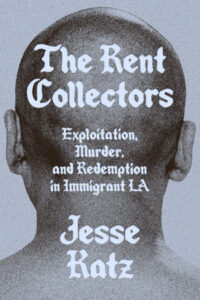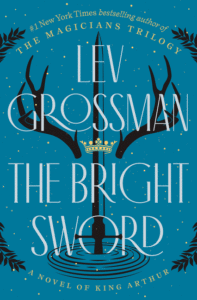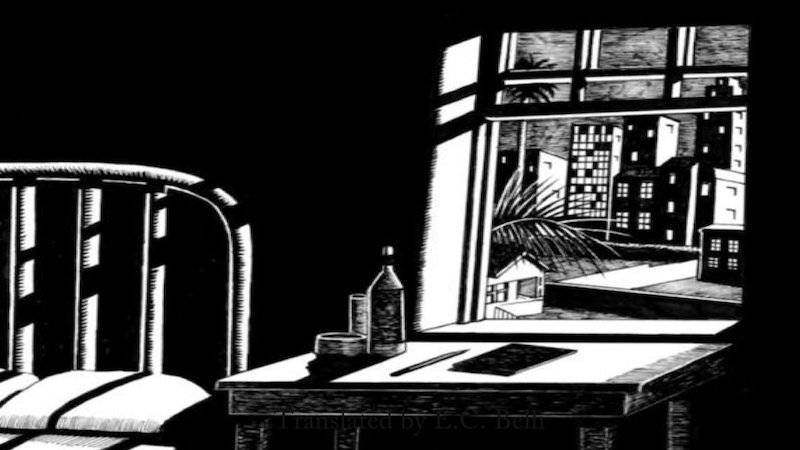5 Book Reviews You Need to Read This Week
“Is the sad millennial girl going to make it after all? No, of course not.”
Our treasure trove of terrific reviews this week includes Ben Ehrenreich on Jesse Katz’s The Rent Collectors, Rhian Sasseen ơn Aysegül Savas’ The Anthropologists, Elizabeth Hand on Lev Grossman’s The Bright Sword, Kerry Howley on Barrett Brown’s My Glorious Defeats, and Annie Berke on Halle Butler’s Banal Nightmare.
Brought to you by Book Marks, Lit Hub’s home for book reviews.
*

“I was glad when I learned that the veteran L.A. journalist Jesse Katz had written a book about the incident. I was also apprehensive. In most media narratives, there are only two kinds of immigrants: victims and victimizers, angels and thugs. The shooting seemed made for this kind of dichotomy … My anxieties, fortunately, were misplaced. In Macedo, Katz found the story of a lifetime … It’s a credit to Katz’s skill, compassion and sheer doggedness—he interviewed everyone from Macedo’s cellmate to his mother’s relatives in El Salvador—that Macedo emerges from this narrative not as the demon that he flirted with, but as an all too ordinary kid, sad and scatterbrained, neither malevolent nor particularly brave …
The Rent Collectors is filled with such choices that are not choices: impossible crossroads in the lives of people constrained on all sides by forces that will not bend. Katz is acutely attentive not only to the flesh-and-blood personalities that make his story so compelling, but to the structures that both shape and confine them: the city’s hungry and impenetrable bureaucracy, its armies of police, the shadow universe of the prison system and the constant threat of deportation for sins as basic as working to feed one’s family. The state emerges as a character too, a predatory giant, blind and bumbling, creating the very conditions that it tasks itself with correcting … For a tough-guy book about tough guys, this is a work of almost unerring tenderness. If its subtitle promises ‘redemption,’ the book itself delivers something more honest: stories about people broken by powers larger than they are and who nonetheless find the will to fight on.
–Ben Ehrenreich on Jesse Katz’s The Rent Collectors: Exploitation, Murder, and Redemption in Immigrant LA (The New York Times Book Review)
“It is a novel that takes as its subject the texture, routines, and rituals of a particular lifestyle—itinerant and youthful, or at least untethered by children—and serves as sort of a field guide to its participants: those who live ‘without a shared native tongue, without religion, without the web of family and its obligations to keep us in place.’ As such, Savaş has written a book that reads like a fictional ethnography. It has the qualities of an empirical study, the only difference being that the subjects of this study are made-up characters. The type of person Savaş trains her eye on is a wholly contemporary phenomenon, similar on a surface level to the expatriates found in a Henry James novel and yet more hyperconnected and widespread, thanks to the addition of technology …
One of the book’s strengths lies in Savaş’s ability to capture the experience of life as an outsider in a new place while simultaneously revealing absolutely no details that would more firmly situate Asya and Manu in a particular location or even year … Savaş approaches her novel with a keen awareness of the reality through which it crafts and filters its make-believe. In literature, such trends as autofiction have made a convincing case for constructing fiction out of the factual and the true. But The Anthropologists suggests that the inverse might be possible too.”
–Rhian Sasseen ơn Ayşegül Savaş’s The Anthropologists (The Atlantic)
“Grossman affects a breezy 21st-century style that still allows plenty of room for magic. He gives each knight a new and extensive history that frees them from the ur-narrative while honoring it … Grossman’s take on the Arthurian legend may lack the grandeur and tragic gravitas of White’s classic The Once and Future King, but he excels at colorful characterizations and vibrant action scenes, which are legion. Like White, he uses humor liberally and masterfully. And he gets in more scenes of genuine strangeness, especially when Collum finds himself in Morgan le Fay’s kingdom. As Grossman’s splendid, offbeat quest reaches its conclusion, we see Arthur’s waves of Saxon invaders and their many predecessors refracted in a different light, one that helps illuminate our own tumultuous, battle-torn age in the way that only the best epics can.”
–Elizabeth Hand on Lev Grossman’s The Bright Sword (The Washington Post)

“When readers express a desire for ‘truth’ in memoir, they generally mean they want it only to include the falsehoods we have collectively agreed to accept—the stability of memory, of personhood, of childhood dialogue perfectly recalled. Memoirists, striving toward this view of truth, often neglect the literary demands of self-characterization. One needn’t build a character; one is simply oneself, however shrouded in self-delusion. This is decidedly not the situation we find ourselves in with Barrett Brown’s extraordinary new book … Brown is an activist associated with the hacker group Anonymous, and a political prisoner recently denied asylum in Britain, all of which sounds a bit dreary until we hear tell of it through Brown’s unhinged self-regard …
The reader may be forgiven for losing the thread. This is a book in which the stakes are both incredibly high (a state throws you into prison) and very low (a ‘Hobbity-looking’ fellow writes a piece you don’t like in Gizmodo). Brown’s looping, musical sentences are flirtations, bending reason toward satire, hovering always on the fine edge between absurdity and profundity, as if Thomas De Quincey (another fan of opium-derived compounds) had taken upon himself the problems of the post-9/11 military-industrial complex … We’re left with a man who refuses to look away from the deep structure of the world, an unstable position from which there is no sanctuary. My Glorious Defeats is deranged, hyperbolic and as true a work as I have read in a very long time.”
–Kerry Howley on Barrett Brown’s My Glorious Defeats: Hacktivist, Narcissist, Anonymous: A Memoir(The New York Times Book Review)

“In Banal Nightmare, Butler pushes her darkly humorous, mean-spirited worldview to its limits. And while the focus largely remains on Moddie and her friends, the narration declines to honor these characters’ solipsism. The novel wanders away from the action or a character’s inner life to follow some geese for a paragraph or to peek in as ‘someone’s mom lay awake in bed having a sexual fantasy about a colleague.’ These moments feel capacious, delightfully cinematic in a genre that is otherwise very internal. Frankly, sometimes you need a break from these people, and so does the book …
Butler’s grown-up millennial girl-woman novel looks a little like Julia May Jonas’s Vladimir or Sarah Braunstein’s Bad Animals, detailed character studies that double as grotesque institutional burlesques. There’s cringeworthy, sometimes triggering material in Banal Nightmare, but it is also quite funny … As literature looks back to look forward, Butler’s latest offers a compelling map for where she and the genre might go from here: still mean, though not meaner than before, and with bigger stakes for the protagonist and the world she lives in. Is the sad millennial girl going to make it after all? No, of course not. In her defense, she’s been telling you that all along.”
–Annie Berke on Halle Butler’s Banal Nightmare (The Washington Post)























